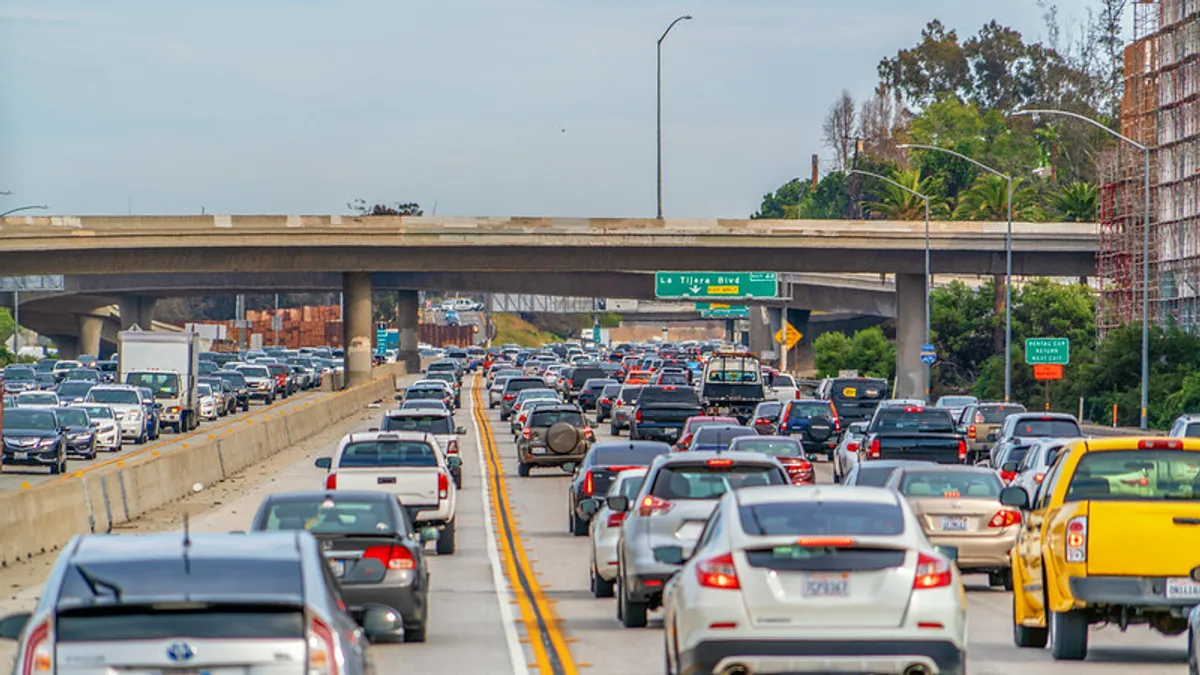Dive Brief:
- Fatalities from motor vehicle crashes decreased slightly in 2019, according to figures released Friday by the National Highway Traffic Safety Administration (NHTSA).
- There were 36,096 fatalities in 2019, down 739 (2%) from 2018, though vehicle miles traveled increased by 0.8%, NHTSA said. Fatalities in most major traffic safety categories saw decreases too: there were 169 fewer pedestrian deaths (down 2.7% from 2018); 568 fewer fatalities caused by alcohol-impaired driving (down 5.3%); 630 fewer deaths of passengers in cars (down 2.8%); and 813 fewer fatalities in urban environments (down 4%).
- NHTSA warned that dangerous driving habits during the coronavirus (COVID-19) pandemic could undo these reductions. The administration said in a special supplementary report for the first half of 2020 that while the number of traffic fatalities between April and June are projected to decrease, there are projected fatality increases across various categories, including in rural areas; among people aged 16-24 years old; with risky drivers, in rollovers and ejections, and among occupants of older vehicles.
Dive Insight:
The administration is "encouraged" by the downturn in fatalities on the nation's streets, and called on all road users to "do their part" to "keep building on those numbers," NHTSA Deputy Administrator James Owens said in a statement. But there are still some troubling statistics in NHTSA's figures, as injuries on U.S. streets ticked up across almost every category, leading some advocates to call for greater action.
In an emailed statement, Securing America's Future Energy (SAFE) President and CEO Robbie Diamond called the small reduction "positive but considerably inadequate." Diamond said that with driver-assist and crash-avoidance technologies available right now for cars, the figures are "simply unacceptable" and at "epidemic levels." SAFE officials pointed to a 2015 study from the Boston Consulting Group that found nearly 10,000 deaths could be prevented with greater use of those driver assistance technologies.
Other groups say there should be policy changes to support the reduction in roadway fatalities. The National Safety Council (NSC), which also projected a slight drop in 2019 road deaths, said embracing Vision Zero policies to make streets safer for all users can be helpful, as well as lowering the legal alcohol concentration limit, although more governments need to advance those policies, the organization said.
"[As] a nation, we still need to demonstrate better commitment to saving lives," Lorraine Martin, NSC President and CEO, said in a statement on the fatality data. "Roadway deaths can be prevented by doubling down on what works, embracing technology advancements and creating a culture of safer driving."
Indeed, the Federal Highway Administration (FHWA) and NHTSA said federal agencies intend to do more to support the implementation of Vision Zero policies in its first Pedestrian Safety Action Plan, released last month.
Advocates for Highway and Auto Safety (Advocates) agreed on the need for policy changes, especially those to support technological innovation as the United States ushers in a new wave of federal leadership in 2021.
"As the new Congress convenes next month and the incoming Biden/Harris Administration takes office, these technologies that hold remarkable potential should be advanced with urgency," said Advocates President Cathy Chase in a statement.
SAFE also urged a quicker embrace of autonomous vehicles (AVs), which it said could dramatically reduce crashes, since 94% are due to human error. "From expanding exemptions for driverless testing to passing federal AV legislation, it is critical we accelerate the responsible deployment of these life-saving technologies," Diamond said. However, various groups are still unsure about the future of AVs and said lawmakers must work harder than in previous iterations to ensure the technology's safety in future legislation.













